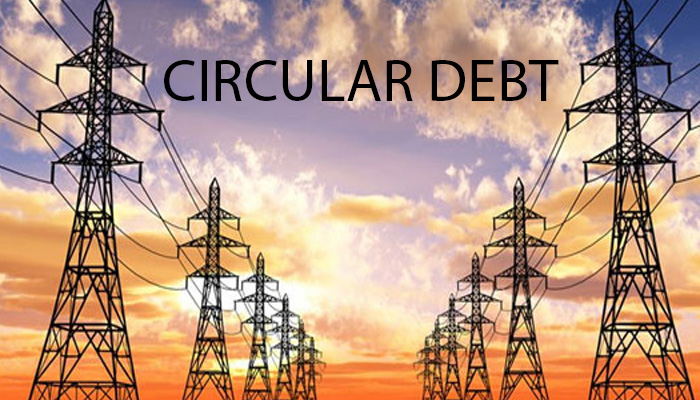Circular Debt: PML-N govt burdened power consumers with Rs180 bn
ISLAMABAD: The previous PML-N government had borrowed Rs180 billion to finance the circular debt and started recovering this amount from the power consumers in the form of surcharges in their electricity bills, Finance Ministry on Tuesday informed the Senate Special Committee on Circular Debt.
The Senate Special Committee on Circular Debt that met here on Tuesday headed by Senator Shibli Faraz was informed by the officials of the finance ministry that previous government had taken Rs180 billion loans to finance the circular debt, but interestingly it is being recovered from power consumers in the form of surcharges.
Faraz said that the government never encouraged alternate energy sources nor the private sector has been supported to install such plants. He said that the government had deliberately discouraged this sector, as to exploit the costly sources of energy.
Joint Secretary of Power Division Zargham said that there is no ban on power generation from alternative sources and anybody can do business in this sector.
CEO of the Alternative Energy Development Board (AEDB) Amjad Awan said that around 1036MWs alternative energy sources-based electricity is being supplied to the national grid. Solar PV power projects are generating 430MWs and added that the Quaid-e-Azam Solar Power Plant has not been failed, it is also generating electricity. He further said that for 16 Bagas-based power plants, tariff and generation licenses have been obtained which have the capacity of 132.4MWs.
Awan said that regarding power generation from alternate sources, the masses have not been sensitized nor awareness campaign had been launched by the government.
Shibli Faraz said to control power shortfall and circular debt, it is necessary to convert these tube wells to solar system and also do effective monitoring of water table.
The CEO of Quetta Electric Supply Company (QESCO) while briefing the committee said that 74.14 percent electricity is being consumed by the agriculture consumers in Qesco. He further said that water table in Qesco jurisdiction has dropped from 300 feet to 850 feet, due to which the agriculture tube wells owners have increased the capacity of electricity pumps. There are 327000 agriculture tube wells under Qesco which is also one of then strumentals in lowering the water table. He said that Balochistan government is not paying our dues. The provincial government has paid only Rs3.4 million out of Rs12.5 million arrears. He further said the ceiling of agriculture tube well bills is Rs75000, of which the owner pay Rs10000 while in remaining amount 60pc is being paid by provincial government and 40 percent by federal government which also adds up to circular debt. Earlier the farmers were paying 4000 rupees and after its increase to 10000, mostly farmers are not paying bills. He further said that the four grid stations have been upgraded.
He further said that electricity demand of Balochistan is 1800MWs while it is being supplied only 1000MWs. For domestic and industrial consumption 230MWs is used, while remaining is being consumed by tube wells.
Joint Secretary Zargham said that we have sent PC-I to the Planning Commission for converting 10000 agriculture tube wells in Balochistan from grid electricity to solar system.
Last year, the government had paid around Rs118 billion as power subsidy. For this year [2018] it would be Rs150 billion. This subsidy is being provided to agriculture tube wells and to those domestic consumers who consume less than 300 units. For agriculture tube wells in Balochistan, nine billion rupees of subsidy would be provided.
Senator Bahramand Khan Tangi said that still there is 22 hours power outage in his constituency despite 90 percent people are paying their bills. Shabqadar grid station is lying closed, he said.
The committee was attended by Senator Bahramand Khan Tangi, Senator Dr. Sikandar Ali Mandhro and senior officers of the Ministry of Finance, Power Division, Nepra, Qesco, Kapco. Representatives of energy companies operating in the private sector as well as from the alternative and renewable energy sector also attended the meeting.
-
 Spencer Pratt Recalls Meeting Ryan Gosling Before Fame
Spencer Pratt Recalls Meeting Ryan Gosling Before Fame -
 Meghan Markle's As Ever Facing Branding Problems?
Meghan Markle's As Ever Facing Branding Problems? -
 Kate Middleton Is More Relaxed In 'Wellington Boots Than Diamond Tiara'
Kate Middleton Is More Relaxed In 'Wellington Boots Than Diamond Tiara' -
 Gaten Matarazzo Addresses Important Fans Query About 'Stranger Things'
Gaten Matarazzo Addresses Important Fans Query About 'Stranger Things' -
 Prince William's Latest Move Reveals Rift Is Strong With Prince Harry
Prince William's Latest Move Reveals Rift Is Strong With Prince Harry -
 Princess Eugenie Becomes Second Royal After Meghan To Feature In Viral Trend
Princess Eugenie Becomes Second Royal After Meghan To Feature In Viral Trend -
 Carol Burnett Sings Praises Of Late Jimmy Stewart: 'He Had THIS'
Carol Burnett Sings Praises Of Late Jimmy Stewart: 'He Had THIS' -
 Kate Middleton Dashes Through Rain At Windsor Castle
Kate Middleton Dashes Through Rain At Windsor Castle -
 Dave Filoni, Who Oversaw Pedro Pascal's 'The Mandalorian' Named President Of 'Star Wars' Studio Lucasfilm
Dave Filoni, Who Oversaw Pedro Pascal's 'The Mandalorian' Named President Of 'Star Wars' Studio Lucasfilm -
 Is Sean Penn Dating A Guy?
Is Sean Penn Dating A Guy? -
 Sebastian Stan's Godmother Gives Him New Title
Sebastian Stan's Godmother Gives Him New Title -
 Alison Arngrim Reflects On 'Little House On The Prairie' Audition For THIS Reason
Alison Arngrim Reflects On 'Little House On The Prairie' Audition For THIS Reason -
 Spencer Pratt Reflects On Rare Bond With Meryl Streep's Daughter
Spencer Pratt Reflects On Rare Bond With Meryl Streep's Daughter -
 'Stranger Things' Star Gaten Matarazzo Recalls Uncomfortable Situation
'Stranger Things' Star Gaten Matarazzo Recalls Uncomfortable Situation -
 Gaten Matarazzo On Unbreakable Bonds Of 'Stranger Things'
Gaten Matarazzo On Unbreakable Bonds Of 'Stranger Things' -
 Beyonce, Jay-Z's Daughter Blue Ivy Carter's Massive Fortune Taking Shape At 14?
Beyonce, Jay-Z's Daughter Blue Ivy Carter's Massive Fortune Taking Shape At 14?




